外研版必修三 Module 5 Great People and Great Inventions of Ancient China Grammar定语从句课件(52张)
文档属性
| 名称 | 外研版必修三 Module 5 Great People and Great Inventions of Ancient China Grammar定语从句课件(52张) |
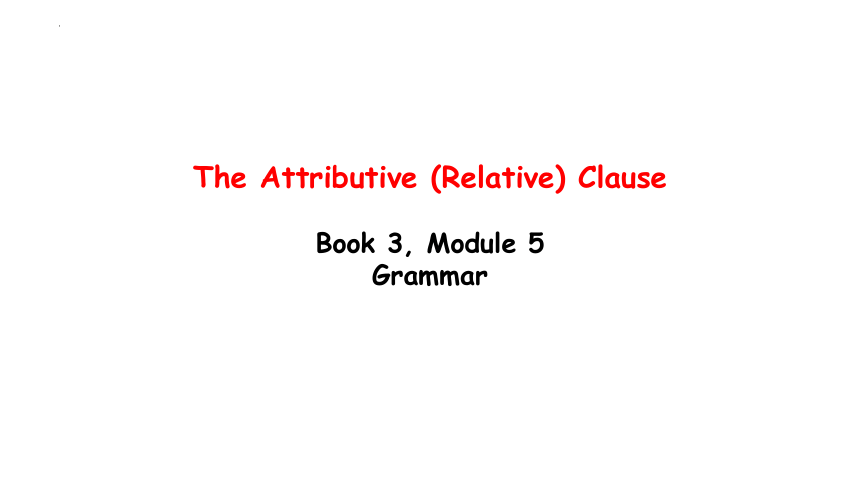
|
|
| 格式 | pptx | ||
| 文件大小 | 24.1MB | ||
| 资源类型 | 教案 | ||
| 版本资源 | 外研版 | ||
| 科目 | 英语 | ||
| 更新时间 | 2022-09-13 15:20:20 | ||
图片预览



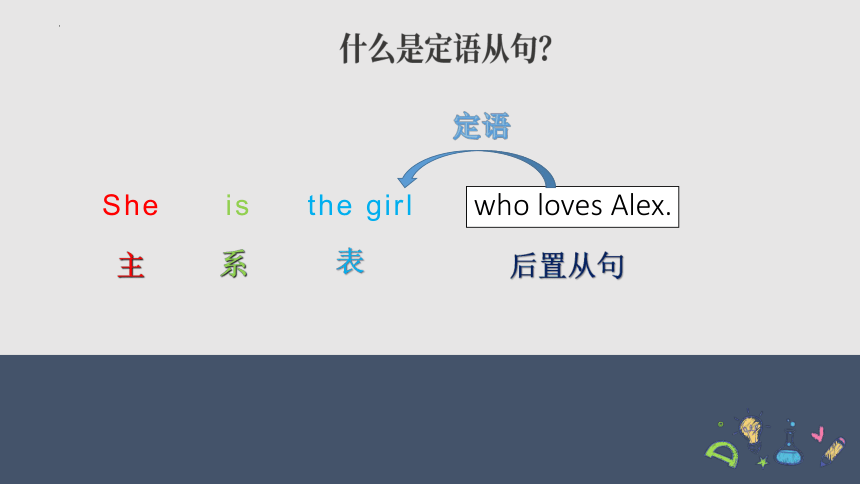
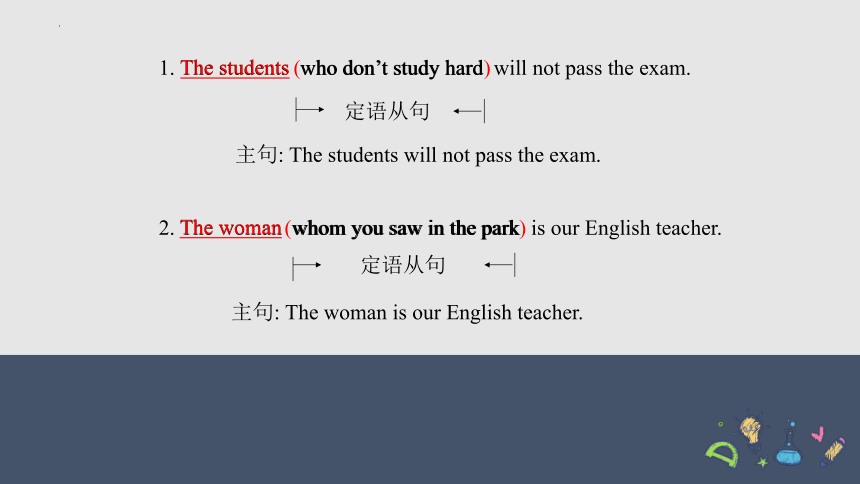


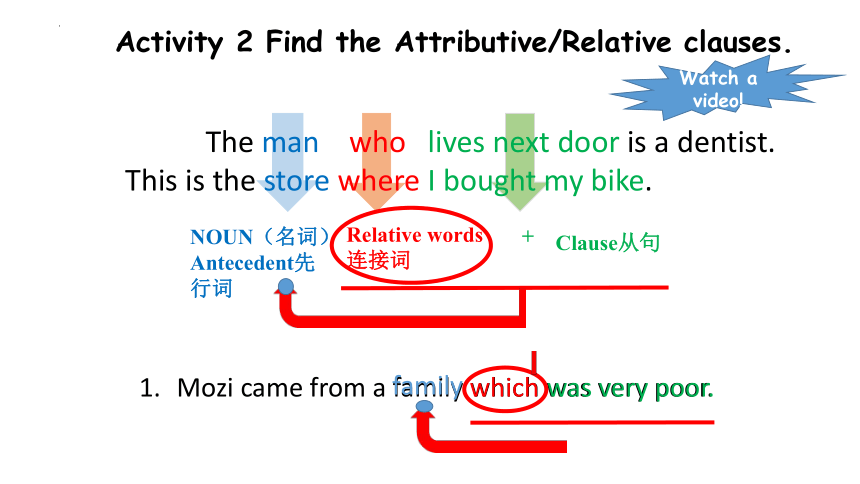
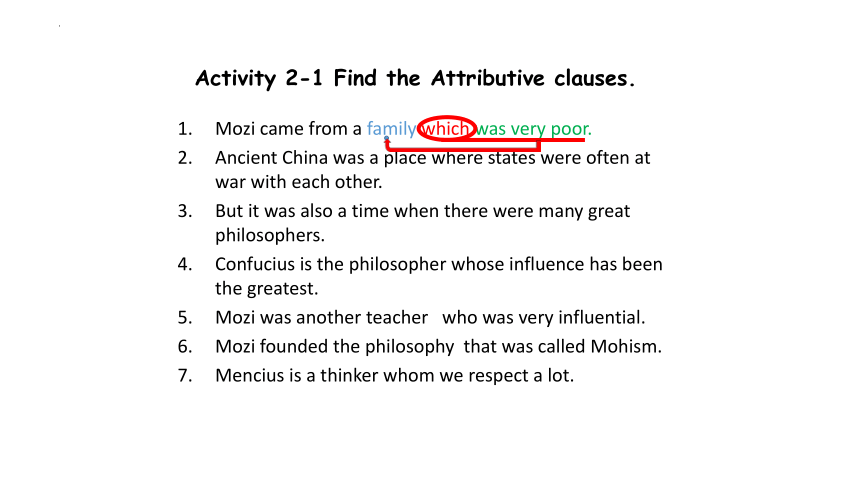
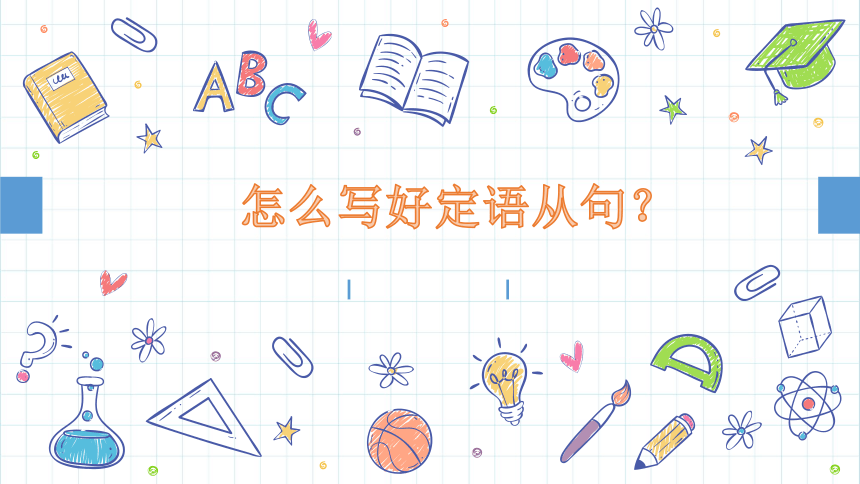

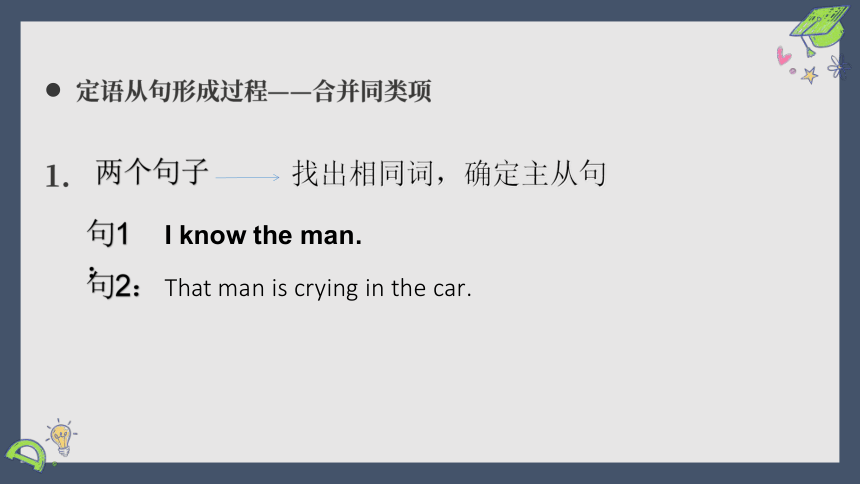
文档简介
(共52张PPT)
The Attributive (Relative) Clause
Book 3, Module 5
Grammar
什么是定语从句?
如何判断是否是定语从句?
怎么写好定语从句?
怎么选择关系词?
I like girls.
I like girls with long hair.
I like girls with long hair, big eyes and dimples.
限定的语言,限定名词/代词的范围
我喜欢女生。
我喜欢长头发的女生。
我喜欢长头发大眼睛小酒窝的女生
who loves Alex.
定语
主
系
表
She
is
the girl
后置从句
1. The students who don’t study hard will not pass the exam.
主句: The students will not pass the exam.
定语从句
2. The woman whom you saw in the park is our English teacher.
定语从句
主句: The woman is our English teacher.
(who don’t study hard)
(whom you saw in the park)
The students
The woman
如何判断是否是定语从句?
Mozi came from a family which was very poor.
Ancient China was a place where states were often at war with each other.
The doctor insists that I give up smoking
Confucius is the philosopher whose influence has been the greatest.
Mozi was another teacher who was very influential.
He said that light travels much faster than sound.
Mencius is a thinker whom we respect a lot.
Activity 1 Find the Main sentences
and clause
Activity 2 Find the Attributive/Relative clauses.
The man who lives next door is a dentist.
This is the store where I bought my bike.
NOUN(名词)
Antecedent先行词
Relative words
连接词
Clause从句
+
Mozi came from a family which was very poor.
family
which
was very poor.
Watch a video!
Mozi came from a family which was very poor.
Ancient China was a place where states were often at war with each other.
But it was also a time when there were many great philosophers.
Confucius is the philosopher whose influence has been the greatest.
Mozi was another teacher who was very influential.
Mozi founded the philosophy that was called Mohism.
Mencius is a thinker whom we respect a lot.
Activity 2-1 Find the Attributive clauses.
怎么写好定语从句?
合并同类项
That man is crying in the car.
句2:
I know the man.
句1:
两个句子
找出相同词,确定主从句
I know the man the man is crying in the car.
The man is crying in the car.
句2:
I know the man.
句1:
先行词
用词代替
I know the man who is crying in the car.
关系代词:
1、代指 the man
2、指示主句与从句的关系,从句低一级
先行词
句1:I do not like books.
句2:Books do not have pictures.
I do not like books which do not have pictures.
I do not like books books do not have pictures.
两个句子
关系代词:
1、代指 books
2、指示主句与从句的关系,从句低一级
先行词
粗暴合并
替换同类项
This is my dream. My dream never comes true.
This is my dream which/that never comes true.
my dream
My dream
1. the same nouns
2. the main sentence
3. the relative word
Activity 4 Look at the pictures and make sentences using Attributive (Relative) Clause.
( )
The boys are receiving punishment . The boy didn’t finish the reciting task. (who)
The boy who didn’t finish the reciting task is receiving punishment.
Activity 4 Look at the pictures and make sentences using Attributive (Relative) Clause.
I will never forget the day .
I read the interesting composition. (when)
We will never forget the day when I read the interesting composition.
Activity 4 Look at the pictures and make sentences using Attributive (Relative) Clause.
Activity 4 Look at the pictures and make sentences using Attributive (Relative) Clause.
This is our school.
We study and make friends in this school. (where)
This is our school where we study and make friends.
The reason why Juli married him is that she fell in love with him at the first sight.
Activity 4 Look at the pictures and make sentences using Attributive (Relative) Clause.
Juli fell in love with him at the first sight.
Bryce married her.
1. (why) 2.(whom)
Juli married him whom she fell in love with at the first sight.
He is a senior high student. (whose)
The student’s English teacher is very beautiful.
He is a senior high student whose English teacher is very beautiful.
Activity 4 Look at the pictures and make sentences using Attributive (Relative) Clause.
怎么选择关系词?
引导定语从句的关系词
指代人
指代事物
所属关系
指地点
指时间
指原因
who,whom,that
which,that
whose
where
when
why
基础知识
关系代词
关系副词
关系形容词
1、who 的用法
who指人,在从句中做主语或宾语
The boys who are playing football are from Class One.
分解
The boys are from Class One
The boys are playing football
做主语
关系代词
1、who 的用法
who指人,在从句中做主语或宾语
The woman who you saw in the park is our English teacher.
分解
The woman is our English teacher.
You saw the woman in the park
做宾语
关系代词
1、who 的用法
who指人,在从句中做主语或宾语
The man who called yesterday wants to buy the house.
关系代词
The man plans to find four musicians who could sing.
The family who I met at the airport were very kind.
2. whom也指人,但在定语从句中充当宾语,常可省略。
Mr. Liu is the man (whom) you talked about.
Mr. Liu is the man
分解
You talked about the man
注意:关系代词whom在口语和非正式语体中常用who代替,可省略。
作宾语
关系代词
关系代词
Chen Zijiang is a paper-cutting expert whom I saw yesterday.
2. whom也指人,但在定语从句中充当宾语,常可省略。
Do you remember the boy with whom I used to go out
注意:whom在从句中作介词的宾语,且介词置于whom前时不能用who代替
3. whose 作定语从句的定语.
I know the girl whose mother is a teacher.
分解
I know the girl.
The girl’s mother is a teacher.
作定语
名词所有格
关系代词
3. whose 作定语从句的定语.
He's a man whose opinion I respect.
关系代词
It's the house whose door is painted red.
A shoe shop is a shop which sells shoes.
关系代词
4、which 的用法
which指物,在从句中做主语或宾语
分解
A shoe shop is a shop
The shop sells shoes
做主语
He told us about the countries which he had visited.
关系代词
4、which 的用法
which指物,在从句中做主语或宾语
分解
He told us about the countries
He had visited the countries
做宾语
He prefers groups which play quiet and slow songs.
关系代词
4、which 的用法
which指物,在从句中做主语或宾语
This is the book which he is looking for.
5. that 可以作定语从句的主语和宾语.
可省略
The woman (who/whom/that) you met on the street worked in a hospital.
The pen (which/that) I bought yesterday is on the desk.
关系代词
which = that who = that
如何选定定语从句关系词
1.分辨主句和定语从句
2.确定定语从句是否完整
3.确定定语从句的先行词(人/物/人和物)
用关系代词填空:that 、which 、who、 whom 、whose
1.This is the man __________wants to see you.
2. Clock is a thing __________ tells people the time.
4. This is the boy with _______he talked.
5. The man _________ leg broke in a game used to be a football player.
who /that
which /that
whom
whose
关系副词
where when why
1、where 作地点状语
I want to know the place.
I was born in the place.
I want to know the place where (= in which) I was born.
where = 介词 + which
The table where (= at which ) she is sitting is a new one.
关系副词
I forgot the place where (= ____ which ) I had hidden the box.
It is the year.
The Olympic Games begins in the year.
when 作时间状语:
2 .时间名词+when+定语从句
She will never forget the day when (=on which) she won the game.
When = 介词 + which
It is the year when (= in which) the Olympic Games begins.
She will never forget the day.
She won the game on that day.
关系副词
3.表原因的名词reason + why + 定语从句
(why只用于reason之后的限制性定语从句中,在定语从句中作原因状语。)
This is the reason he gave his teacher in the classroom.
The reason he did not go to school is that he was ill.
which/that
why
This is the reason.
He gave his teacher the reason in the classroom.
why = for which
关系副词
when where和why都可以替换成“介词 + which”
Do you still remember the day on which/when we first met in Nantong
This is the room in which/where we lived last year.
Do you know the reason for which/why he didn't go to Mary’s birthday party.
(on which=when)
(in which=where)
(for which=why)
关系副词
关系副词小结
when= on(in at during...) which
where=in(at on...) which
why=for which
关
系
副
词
where when why
1. This is the place ___ John was born
A. which B. where C. when
2. The days ___ we spent in Tokyo together will never be forgotten.
A. when B. which C. on which
3. Don't forget the day ___ you came to Beijing University.
A. when B. that C. at which
All _____we have to do is try our best.
Activity 5 that in Attributive (Relative) Clause.
that
1.当先行词是all, few, litter, much, something, anything, nothing, everything等不定代词时,只用that。
She is the only girl ______ won the first class athletes.
Activity 5 that in Attributive (Relative) Clause.
that
2.当先行词被the only, the very, the same, the last所修饰时,只用that。
This is the most valuable picture_____we have ever taken in our class.
Activity 5 that in Attributive (Relative) Clause.
that
3.当先行词是序数词或形容词最高级,或被其修饰时,只用that。
We were deeply moved by these girls and their dance _____ we saw on basketball match.
Activity 5 that in Attributive (Relative) Clause.
that
4.先行词既有人又有物只用that。
Who is the boy ______ ran so fast
Activity 5 that in Attributive (Relative) Clause.
that
第二名呢?
5.主句是以who或which开头的特殊疑问句时,只用that。
1.当先行词是all, few, litter, much, something, anything, nothing, everything等不定代词时,只用that。
2.当先行词被the only, the very, the same, the last所修饰时,只用that。
3.当先行词是序数词或形容词最高级,或被其修饰时,只用that。
4.先行词既有人又有物只用that。
5.主句是以who或which开头的特殊疑问句时,只用that。
Activity6 Use that, who, whom, which, where, when, why, whose to fill in the blanks and guess who she is.
This is a woman _______ majored in music. She acted in Beijing for the first time in 1980 ____ she was still a student. She took part in many Spring Festival Galas _________were loved by all Chinese people. She married our Chairman _________ we all knew. They lived in a lovely apartment _____ their daughter was born. Many foreigners know her and her songs ____ are loved by our Chinese people. She is the most famous woman ___is loved by children too. The reason ____ she is so popular is not just that she married the powerful man but she cares about the people_____ life is ordinary.
who/that
when
which/that
where
that
why
that
whose
whom/who
Activity 7 Work in groups.
Introduce one of the students or teachers in our class and guess who it is.
Student A: That & Whom
Student B: Who & Which
Student C: Where & When
Student D: Why & Whose
The Attributive (Relative) Clause
Book 3, Module 5
Grammar
什么是定语从句?
如何判断是否是定语从句?
怎么写好定语从句?
怎么选择关系词?
I like girls.
I like girls with long hair.
I like girls with long hair, big eyes and dimples.
限定的语言,限定名词/代词的范围
我喜欢女生。
我喜欢长头发的女生。
我喜欢长头发大眼睛小酒窝的女生
who loves Alex.
定语
主
系
表
She
is
the girl
后置从句
1. The students who don’t study hard will not pass the exam.
主句: The students will not pass the exam.
定语从句
2. The woman whom you saw in the park is our English teacher.
定语从句
主句: The woman is our English teacher.
(who don’t study hard)
(whom you saw in the park)
The students
The woman
如何判断是否是定语从句?
Mozi came from a family which was very poor.
Ancient China was a place where states were often at war with each other.
The doctor insists that I give up smoking
Confucius is the philosopher whose influence has been the greatest.
Mozi was another teacher who was very influential.
He said that light travels much faster than sound.
Mencius is a thinker whom we respect a lot.
Activity 1 Find the Main sentences
and clause
Activity 2 Find the Attributive/Relative clauses.
The man who lives next door is a dentist.
This is the store where I bought my bike.
NOUN(名词)
Antecedent先行词
Relative words
连接词
Clause从句
+
Mozi came from a family which was very poor.
family
which
was very poor.
Watch a video!
Mozi came from a family which was very poor.
Ancient China was a place where states were often at war with each other.
But it was also a time when there were many great philosophers.
Confucius is the philosopher whose influence has been the greatest.
Mozi was another teacher who was very influential.
Mozi founded the philosophy that was called Mohism.
Mencius is a thinker whom we respect a lot.
Activity 2-1 Find the Attributive clauses.
怎么写好定语从句?
合并同类项
That man is crying in the car.
句2:
I know the man.
句1:
两个句子
找出相同词,确定主从句
I know the man the man is crying in the car.
The man is crying in the car.
句2:
I know the man.
句1:
先行词
用词代替
I know the man who is crying in the car.
关系代词:
1、代指 the man
2、指示主句与从句的关系,从句低一级
先行词
句1:I do not like books.
句2:Books do not have pictures.
I do not like books which do not have pictures.
I do not like books books do not have pictures.
两个句子
关系代词:
1、代指 books
2、指示主句与从句的关系,从句低一级
先行词
粗暴合并
替换同类项
This is my dream. My dream never comes true.
This is my dream which/that never comes true.
my dream
My dream
1. the same nouns
2. the main sentence
3. the relative word
Activity 4 Look at the pictures and make sentences using Attributive (Relative) Clause.
( )
The boys are receiving punishment . The boy didn’t finish the reciting task. (who)
The boy who didn’t finish the reciting task is receiving punishment.
Activity 4 Look at the pictures and make sentences using Attributive (Relative) Clause.
I will never forget the day .
I read the interesting composition. (when)
We will never forget the day when I read the interesting composition.
Activity 4 Look at the pictures and make sentences using Attributive (Relative) Clause.
Activity 4 Look at the pictures and make sentences using Attributive (Relative) Clause.
This is our school.
We study and make friends in this school. (where)
This is our school where we study and make friends.
The reason why Juli married him is that she fell in love with him at the first sight.
Activity 4 Look at the pictures and make sentences using Attributive (Relative) Clause.
Juli fell in love with him at the first sight.
Bryce married her.
1. (why) 2.(whom)
Juli married him whom she fell in love with at the first sight.
He is a senior high student. (whose)
The student’s English teacher is very beautiful.
He is a senior high student whose English teacher is very beautiful.
Activity 4 Look at the pictures and make sentences using Attributive (Relative) Clause.
怎么选择关系词?
引导定语从句的关系词
指代人
指代事物
所属关系
指地点
指时间
指原因
who,whom,that
which,that
whose
where
when
why
基础知识
关系代词
关系副词
关系形容词
1、who 的用法
who指人,在从句中做主语或宾语
The boys who are playing football are from Class One.
分解
The boys are from Class One
The boys are playing football
做主语
关系代词
1、who 的用法
who指人,在从句中做主语或宾语
The woman who you saw in the park is our English teacher.
分解
The woman is our English teacher.
You saw the woman in the park
做宾语
关系代词
1、who 的用法
who指人,在从句中做主语或宾语
The man who called yesterday wants to buy the house.
关系代词
The man plans to find four musicians who could sing.
The family who I met at the airport were very kind.
2. whom也指人,但在定语从句中充当宾语,常可省略。
Mr. Liu is the man (whom) you talked about.
Mr. Liu is the man
分解
You talked about the man
注意:关系代词whom在口语和非正式语体中常用who代替,可省略。
作宾语
关系代词
关系代词
Chen Zijiang is a paper-cutting expert whom I saw yesterday.
2. whom也指人,但在定语从句中充当宾语,常可省略。
Do you remember the boy with whom I used to go out
注意:whom在从句中作介词的宾语,且介词置于whom前时不能用who代替
3. whose 作定语从句的定语.
I know the girl whose mother is a teacher.
分解
I know the girl.
The girl’s mother is a teacher.
作定语
名词所有格
关系代词
3. whose 作定语从句的定语.
He's a man whose opinion I respect.
关系代词
It's the house whose door is painted red.
A shoe shop is a shop which sells shoes.
关系代词
4、which 的用法
which指物,在从句中做主语或宾语
分解
A shoe shop is a shop
The shop sells shoes
做主语
He told us about the countries which he had visited.
关系代词
4、which 的用法
which指物,在从句中做主语或宾语
分解
He told us about the countries
He had visited the countries
做宾语
He prefers groups which play quiet and slow songs.
关系代词
4、which 的用法
which指物,在从句中做主语或宾语
This is the book which he is looking for.
5. that 可以作定语从句的主语和宾语.
可省略
The woman (who/whom/that) you met on the street worked in a hospital.
The pen (which/that) I bought yesterday is on the desk.
关系代词
which = that who = that
如何选定定语从句关系词
1.分辨主句和定语从句
2.确定定语从句是否完整
3.确定定语从句的先行词(人/物/人和物)
用关系代词填空:that 、which 、who、 whom 、whose
1.This is the man __________wants to see you.
2. Clock is a thing __________ tells people the time.
4. This is the boy with _______he talked.
5. The man _________ leg broke in a game used to be a football player.
who /that
which /that
whom
whose
关系副词
where when why
1、where 作地点状语
I want to know the place.
I was born in the place.
I want to know the place where (= in which) I was born.
where = 介词 + which
The table where (= at which ) she is sitting is a new one.
关系副词
I forgot the place where (= ____ which ) I had hidden the box.
It is the year.
The Olympic Games begins in the year.
when 作时间状语:
2 .时间名词+when+定语从句
She will never forget the day when (=on which) she won the game.
When = 介词 + which
It is the year when (= in which) the Olympic Games begins.
She will never forget the day.
She won the game on that day.
关系副词
3.表原因的名词reason + why + 定语从句
(why只用于reason之后的限制性定语从句中,在定语从句中作原因状语。)
This is the reason he gave his teacher in the classroom.
The reason he did not go to school is that he was ill.
which/that
why
This is the reason.
He gave his teacher the reason in the classroom.
why = for which
关系副词
when where和why都可以替换成“介词 + which”
Do you still remember the day on which/when we first met in Nantong
This is the room in which/where we lived last year.
Do you know the reason for which/why he didn't go to Mary’s birthday party.
(on which=when)
(in which=where)
(for which=why)
关系副词
关系副词小结
when= on(in at during...) which
where=in(at on...) which
why=for which
关
系
副
词
where when why
1. This is the place ___ John was born
A. which B. where C. when
2. The days ___ we spent in Tokyo together will never be forgotten.
A. when B. which C. on which
3. Don't forget the day ___ you came to Beijing University.
A. when B. that C. at which
All _____we have to do is try our best.
Activity 5 that in Attributive (Relative) Clause.
that
1.当先行词是all, few, litter, much, something, anything, nothing, everything等不定代词时,只用that。
She is the only girl ______ won the first class athletes.
Activity 5 that in Attributive (Relative) Clause.
that
2.当先行词被the only, the very, the same, the last所修饰时,只用that。
This is the most valuable picture_____we have ever taken in our class.
Activity 5 that in Attributive (Relative) Clause.
that
3.当先行词是序数词或形容词最高级,或被其修饰时,只用that。
We were deeply moved by these girls and their dance _____ we saw on basketball match.
Activity 5 that in Attributive (Relative) Clause.
that
4.先行词既有人又有物只用that。
Who is the boy ______ ran so fast
Activity 5 that in Attributive (Relative) Clause.
that
第二名呢?
5.主句是以who或which开头的特殊疑问句时,只用that。
1.当先行词是all, few, litter, much, something, anything, nothing, everything等不定代词时,只用that。
2.当先行词被the only, the very, the same, the last所修饰时,只用that。
3.当先行词是序数词或形容词最高级,或被其修饰时,只用that。
4.先行词既有人又有物只用that。
5.主句是以who或which开头的特殊疑问句时,只用that。
Activity6 Use that, who, whom, which, where, when, why, whose to fill in the blanks and guess who she is.
This is a woman _______ majored in music. She acted in Beijing for the first time in 1980 ____ she was still a student. She took part in many Spring Festival Galas _________were loved by all Chinese people. She married our Chairman _________ we all knew. They lived in a lovely apartment _____ their daughter was born. Many foreigners know her and her songs ____ are loved by our Chinese people. She is the most famous woman ___is loved by children too. The reason ____ she is so popular is not just that she married the powerful man but she cares about the people_____ life is ordinary.
who/that
when
which/that
where
that
why
that
whose
whom/who
Activity 7 Work in groups.
Introduce one of the students or teachers in our class and guess who it is.
Student A: That & Whom
Student B: Who & Which
Student C: Where & When
Student D: Why & Whose
